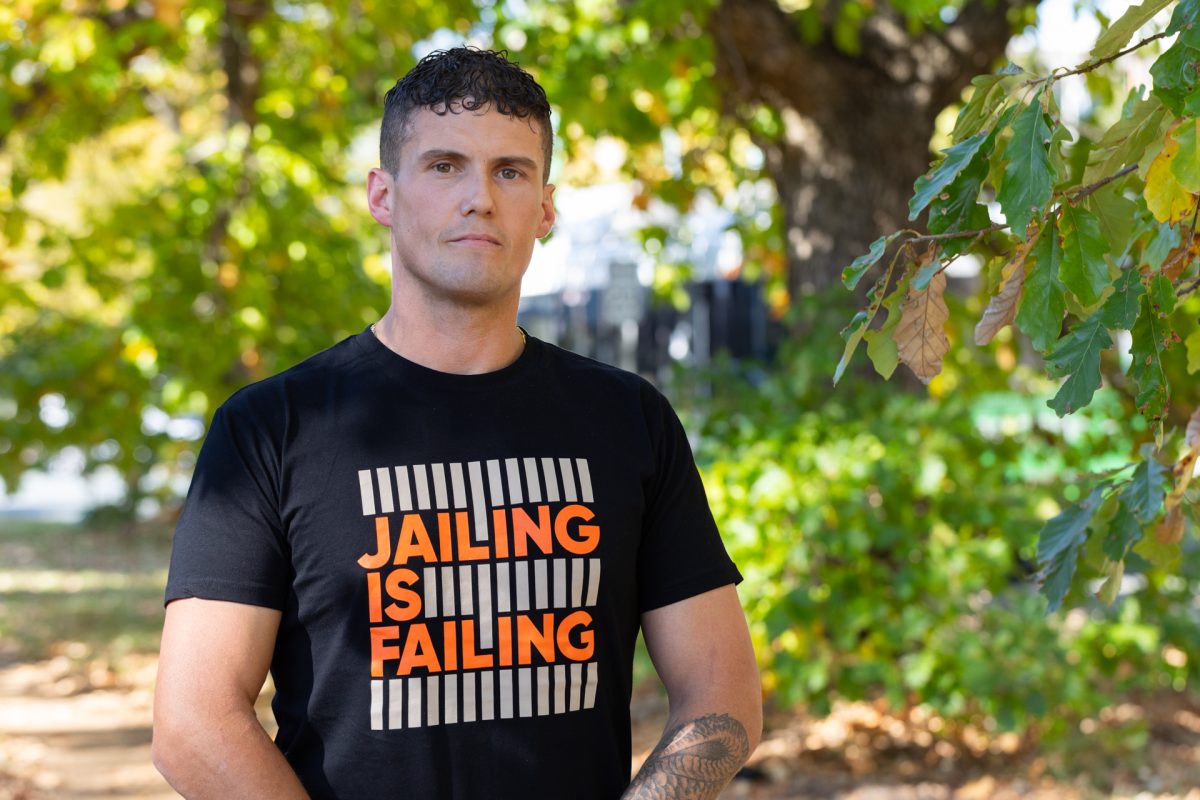
Jayke Fleury recently graduated from a first-of-its-kind program by the Justice Reform Initiative. Photo: Michelle Kroll.
Does the prospect of jail stop someone from committing crimes? This question can elicit an emotive debate, but one man who has spent time behind bars has a clear answer.
“It’s not a deterrent, and it becomes less of a deterrent,” 38-year-old Jayke Fleury said.
“When people commit offences, they are not committing offences thinking about going to jail; there are often things going on in their lives … They are caught up in whatever they are caught up in.”
While Fleury has a history of being imprisoned himself, he has also recently graduated from a first-of-its-kind program by the Justice Reform Initiative (JRI) that aims to support and empower people with lived experience of incarceration in the ACT by developing their skills as public speakers and advocates.
He said his time in prison was marked by boredom, remarking there was “nothing positive” in it.
“Jail is a savage place by nature, and when people go there, to survive, they have to shed a bit of their humanity. Once they lose that, it’s a bit harder to find again,” he said.
He also thought people regressed when they were locked up.
“I understand that people aren’t going there for a holiday. I think it’s advantageous for everyone if the drivers behind the offending are addressed,” he said.
“People do return here [to the community] at some point, and it’s in everyone’s interest that they return better people, but that’s not the case at all.”
A report by the JRI, released earlier this year, says the ACT has the highest rate of people returning to prison in Australia, with 80 per cent of all the Territory’s inmates having previously spent time in custody.
It says it costs $120 million to lock up adults and children each year in the ACT. Also, while First Nations people make up only about 2 per cent of the ACT population, they make up 27 per cent of those incarcerated.
Fleury thought it was the “sitting around” and the environment in jail that made detainees regress, and that opportunities to better themselves “just don’t exist”.
“If people can be rehabilitated, it’s for the community’s benefit; that means there will be no more victims and no more cost to the taxpayer,” he said.
“People can become productive members of society.”
He did say jail time was needed in certain cases, but he credits diversionary sentencing as what changed his life as he benefitted from both restorative justice and the ACT’s Drug and Alcohol Court.
This court aims to reduce offending by rehabilitating high-risk and high-need offenders who have serious issues with drug or alcohol use.

Supporters of the Justice Reform Initiative, Professor Lorana Bartels, Robert Tickner, Dr Mindy Sotiri, and the JRI’s ACT campaign coordinator, Indra Esguerra, spoke at the launch of their new report earlier this year. Photo: Albert McKnight.
Fleury said the court looked at addressing the drivers of offending and supporting someone in their rehabilitation, while restorative justice gave an offender “a 3D view of the offending itself”.
“With restorative justice, you are sitting down with the victim, and you really are being held accountable for what you’ve done,” he said.
“The accountability is an important step in acknowledging the harm of your actions. It’s a very, very powerful experience.”
Ultimately, he said there was a need to give inmates “another way to define themselves”.
“For some of them, they’re unfamiliar with anything else,” he said.
“If you’ve spent your whole life in the fire, the frypan doesn’t seem daunting. For someone who knows no other way, there’s no deterrent.
“For me, [jail] is a massive deterrent now because I’d lose everything that I’ve got.”
Fleury is now working in the legal and justice sector and studies legal services and liberal arts at university.
“Life has just done a complete 180 for me,” he said.
“Honestly, I’ve got to pinch myself sometimes. I can’t believe how life has changed.
“It all comes down to how I was given a chance with a different approach.”
The first phase of the JRI’s project saw seven people with lived experience of incarceration in the ACT/Queanbeyan region undertake professional development in storytelling, public speaking, political advocacy and media engagement.
The group, which graduated earlier this month, will be paid to give public speaking engagements and share their experiences with local communities and businesses.
The pilot project will continue with a second training program from August to September this year. Expressions of interest are open; for more information, click here.





















